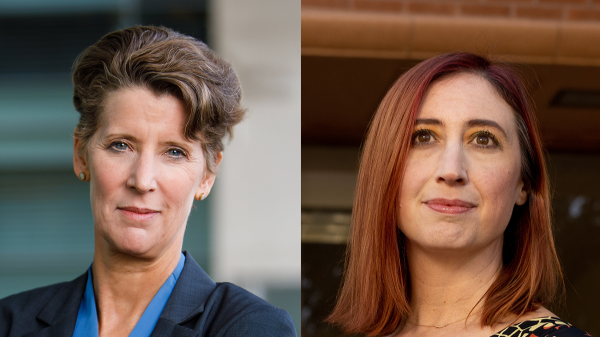Faced with difficult times and professional uncertainty after retiring as a firefighter in 2020, Todd Lunn never gave up on his passion for helping people.
As a testament to his strength and resilience, Lunn has embraced a new career path at Arizona State University that has allowed him to serve his community in a new way: supporting Sun Devils by putting out IT fires instead of burning buildings.
In February, Lunn — alongside his service dog, Ivy — started down a new career path at ASU’s Deskside Support after completing an IT certificate through the Department of Veteran Affairs (VA) and gaining hands-on experience through Enterprise Technology’s Technical Upskilling Program. Deskside Support brings dedicated IT specialists to ASU departments, solving complex IT challenges for staff, teams and faculty.
“I've dedicated my whole life to helping people, and I never thought I'd be able to do that again,” Lunn said. “Being able to help people around ASU find solutions and make their day better is the step I needed to get my life back on track and feel like I have a purpose.”
Lunn’s firefighting career ended abruptly after being diagnosed with post-traumatic stress disorder, commonly referred to as PTSD.
About one in three first responders develop PTSD, a psychological injury caused by exposure to extremely traumatic events where a person either experienced or witnessed events involving harm or a threat to themself or others.
With the help of his wife, Michelle Lunn, he joined the Mighty Oaks Foundation in California, a retreat for firefighters, police and military soldiers living with PTSD seeking help. There he met a police officer who introduced the idea of a service dog.
“PTSD is something you experience internally and you kind of hide from everybody because your self-worth is really shot,” Lunn said. “So this was a way to gain some confidence.”
Shortly thereafter, he got Ivy — a snow-white, 2-year-old Great Pyrenees service dog — through Operation Freedom Paws. The program links service dogs with owners for 48 weeks and offers counseling and community events meant to help reintegrate people living with trauma. As owners instruct their dogs, it helps them develop the confidence to re-enter learning, working and community environments, Lunn said.
“The thing about dogs is they have unconditional love, and no matter if it was a good day or a bad day, she was always going to be there for me,” Lunn said. “That gives you the power to go on the next day and say, ‘OK, we can do this.’”
With the support of his family and Ivy by his side, Lunn started to regain the confidence and optimism he had lost following his retirement and decided to re-enter the workforce.
To accomplish this, Lunn needed to revamp his resume for a role outside the fire department. Through the VA, he completed a nine-month IT course to receive a CompTIA certificate but hit a wall in his job search due to his lack of experience. He also had Ivy with him and would need an opportunity that would empower him to bring a service dog to work daily.
“You don't know what to expect when you’re bringing a service dog into a company or a place of work, which is hard,” Lunn said. “You don't know what obstacles you're going to face.”
That’s when he discovered ASU’s Technical Upskilling Program, which aims to open new doors of opportunity to nontraditional learners by creating pathways toward various IT career paths. The program’s participants represent a developing demographic redefining traditional views of students and internships.
As of 2015, nontraditional learners such as parents, full-time workers and those who delayed post-secondary education constitute 40% of the higher-ed student population, according to the Center for Postsecondary and Economic Success.
Under the program's rotational structure, Lunn quickly gained diverse hands-on experience with teams across Enterprise Technology such as Experience Center, Classroom Support, Program Management and Deskside Support.
As he explored a variety of roles, Lunn enrolled in six ASU Universal Learner Courses at no cost. These courses expanded upon his existing core IT knowledge foundation and offered a Google IT Support Certificate co-branded by ASU upon completion.
“It's nothing but straightforward positivity,” Lunn said. “They've done an incredible job organizing the program. Man, it's truly genuine and sincere — that means a lot.”
Upon starting his new role at ASU’s Deskside Support, he’s able to fulfill his passion for helping people. His journey is a reminder that, with the right support and resources, anything is possible in the face of adversity.
“So often you think there's not a chance for you, and coming to ASU opened my eyes to people's compassion and tolerance again,” Lunn said. “People not judging me has allowed me to come out of my shell and make me feel like I'm actually helping again.”
Written by Kevin Pirehpour; photo by Mike Sanchez; video by Alisha Mendez
More University news

ASU program recognized as a Center of Actuarial Excellence
Arizona State University’s actuarial science program is now recognized by the Society of Actuaries as a Center of Actuarial…

Edison Awards announces Michael M. Crow as 2025 Achievement Award honoree
FORT MYERS, Fla. — The Edison Awards, an organization dedicated to honoring the world's most innovative new products and services…

2 ASU faculty members elected to prestigious National Academy of Medicine
Two distinguished Arizona State University faculty members have been elected to the National Academy of Medicine.Sally C.…
